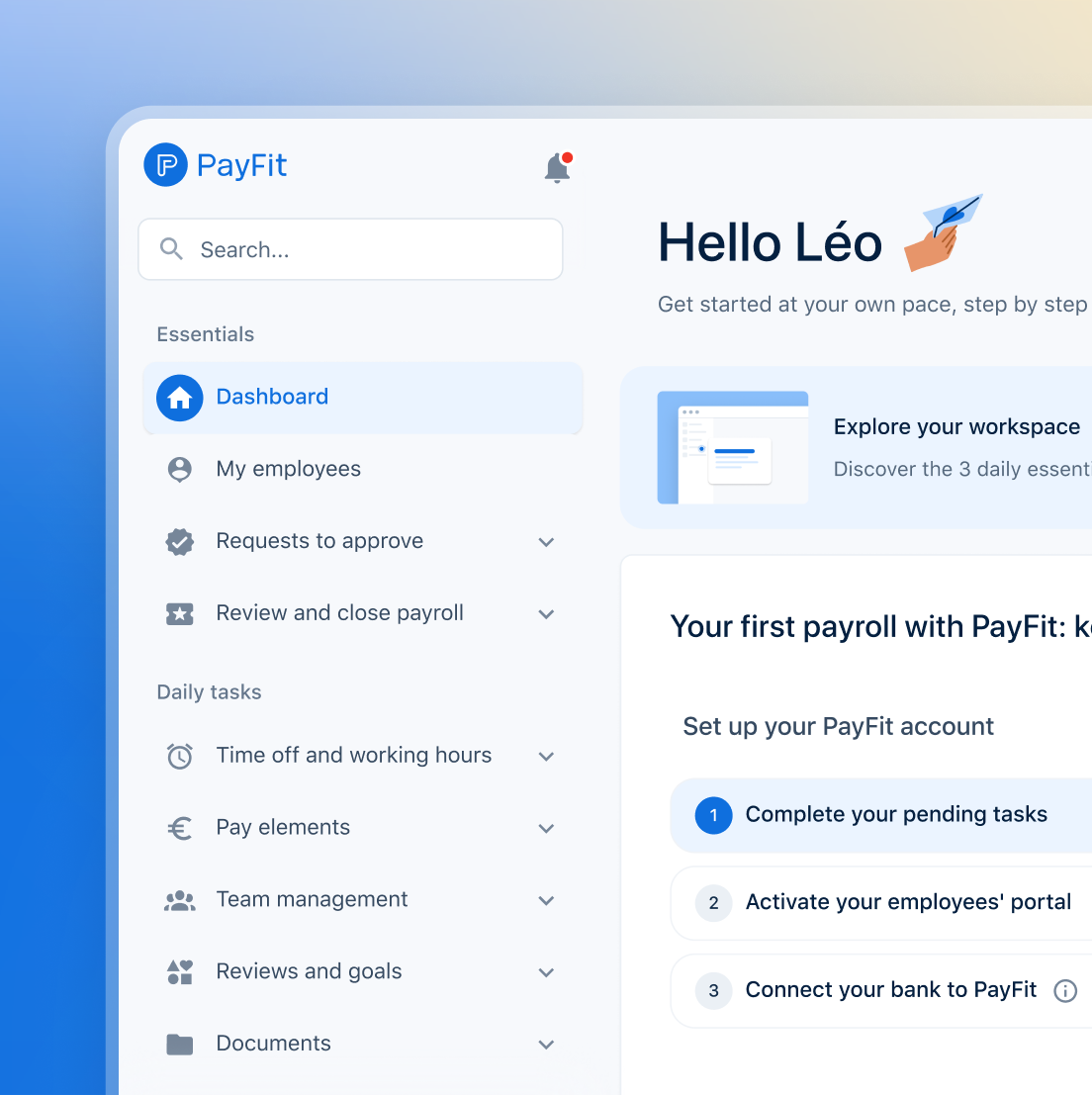✨ Health insurance, now in PayFit - learn more
💷 All the rates & thresholds you need to know for 25/26...right here
✨ The Payroll Journey: Start, Scale & Succeed Globally - learn more
✨ Health insurance, now in PayFit - learn more
💷 All the rates & thresholds you need to know for 25/26...right here
✨ The Payroll Journey: Start, Scale & Succeed Globally - learn more

Being a small or scaling UK business isn’t an excuse for not offering great employee benefits. Indeed, low-cost (or even free) benefits can be the most effective for recruitment and retention. And while salaries and bonuses are major attractions to a particular position or company, it’s the day-to-day perks that connect on a human level and build emotional attachments to an employer that make people less likely to look elsewhere.
So, without further ado, let’s delve into the benefits small businesses can offer employees.
The phrase ‘employee benefits’ tends to mean perks that go above and beyond what an employee earns in terms of a salary (i.e.: the fruits of your collaborative rewards strategy). Most businesses promote some kind of benefits package on their job postings, and what constitutes a benefit means different things to different employers (and employees).
The great news for small businesses is that a little can go a long way in terms of what you offer your people, and those you’re trying to attract, as it’s all a question of relativity. Sure, a jobseeker applying for roles with the likes of Google, Airbnb, or Apple might expect big budget benefits such as global travel allowances, lavish social events and onsite swimming pools.
But to somebody browsing roles at small UK businesses, the promise of an office fridge full of beers on a Friday, getting their birthday off, or even some sea views might be the difference between them choosing your business and one of a rival.
Because the definition of employee benefits is so broad, it gives HR leaders and owners a large degree of scope for tailoring small business employee benefits packages that can outsmart the competition.
With over 90% of UK businesses facing significant challenges in recruiting and retaining skilled employees, it’s more important than ever that small businesses are doing all they can to both consolidate and grow.
Employee benefits for small businesses come in many different forms, each contributing towards improving employee wellbeing, increasing productivity and engagement, as well as helping you achieve cultural, valued-based and financial business objectives.
Thoughtfully mapped out small business employee benefits strategies can also support your managers to improve their people management skills, as they help encourage sound team behaviours, buy-in and more harmonious relationships.

You don’t need a campus in Northern California with its own green transport network and Michelin-starred restaurant to attract and retain the brightest brains in your field.
Many of your existing employees will stick around and contribute to your growth because they’re invested in your company’s culture and values, and benefits can form an integral part of that. And when it comes to attracting new talent, a benefits package aligned to the values of those you’re looking to hire will increase your chances of landing them ahead of the competition.
Let’s look at just some of the low-cost benefits small businesses can offer employees.
A cliche it may be, but a healthy employee is a happy employee, and a happy employee is more likely to try to do their best work for you. There are so many health and wellbeing benefits that small businesses can offer to both current and respective staff, right across the cost spectrum. Here’s some of our favourites.
Weekly running / yoga clubs - Sitting at the lower end of the cost spectrum, weekly running or yoga clubs can be set up by an existing member of staff for free. Employers can then increase the uptake with prizes for attendance and best results, further strengthening relationships.
Mindfulness app subscriptions - Most meditation and mindfulness apps, for example Headspace, cost around £50 for the year, making it a low cost way for employees to recharge their minds and bodies at the end of a long day.
Fruit & veg boxes - As the Cost of Living crisis continues to bite, any support employees can get with their food bills, and better yet be encouraged to eat healthily, will be welcomed with gusto. All those vitamins should help lower the number of sick days your staff members take, ensuring work and projects can keep ticking along nicely.
Subsidised gym memberships - Getting a little pricier now, but as and when you feel able to help your staff with their gym costs, this can be a real game changer for recruitment and retention, not to mention the physical and mental fitness of your teams.
Private health insurance - With sometimes lengthy waiting lists, it can be tough getting access to even simple checkups or treatment here in the UK. Private health insurance, whilst being one of the more expensive health benefits for small business employees, but it will be welcomed with open arms, and can truly help attract and keep the best talent with you for the long run (and keep them healthy).
All employees are entitled to a certain amount of statutory annual leave per year, but there are ways to get creative with leave in such a way as it becomes an additional employee benefit for small businesses.
Additional leave is a relatively low cost benefit for small businesses to offer, as it doesn’t involve any money being spent. It can take the form of additional holiday on top of the UK statutory minimum (either immediately or accruing gradually with each year worked), employee birthdays off, extended parental leave or even unlimited time off. The latter in particular is sure to attract and retain employees for many years, even if you aren’t able to compete salaries-wise with your competition.
In the post-pandemic world of work, employees expect to be able to work flexibly. Again, this can take many forms, centreing on both the place and time of work. Being flexible gives employees the chance to work either at the office or remotely (even in other countries, a great perk to offer), outside of their contracted hours (to work around family and other commitments) or to earn a little extra for occasional overtime. All of these together provide compelling examples of employee benefits for small business owners.
With the flexibility element we’ve just spoken about, it can be hugely powerful to offer subsidised train travel, or a certain level of workplace travel budget per month. This encourages employees to travel into the office regularly, for face to face collaboration. It’s particularly useful for city-based businesses looking to attract a wider talent pool from other parts of the UK. With the high cost of commuting, being able to offer a helping hand, should you feel able, will really help existing staff feel valued, and nudge prospective talent towards your door.
Many businesses, startups in particular, give employees the chance to own a piece of the company by investing in shares. It’s a great way of achieving literal buy-in for your strategic vision. Employees will be engaged and motivated to do their best, most productive work for your business, as they are able to benefit from any successes it enjoys. What’s more, it’s a low cost benefit, and everybody wins if you’re successful. It has to be one of the best employee benefits for small businesses to offer, and is offered in addition to a compensation / salary package.

Like most things in a growing business, setting up an employee benefits scheme takes time, effort and thought, with close collaboration between the HR and Finance elements of the organisation. But there are some tried and tested steps to take that will help set you up for success when it comes to the benefits side of things.
The first step in creating a great employee benefits package for your small business is to assess the roles that you need to fill in order to grow. This will help you tailor your benefits packages accordingly. For example if you need to hire lots of salespeople, do you want to put more budget towards commission and bonus packages? Or if you’ve identified a particular skill set in another part of the country, perhaps it’s better to frontload the travel subsidies.
It’s crucial to know what perks and benefits the competition is offering for similar roles, and whether you can afford to outdo them, or if you need to get creative with less.
It’s important that culture and values are being lived throughout the organisation at all times, and this is true also when it comes to employee benefits. If collaboration and teamwork are watchwords when it comes to your culture, then facilitating this with investment in collaboration tools, getting fruit boxes delivered to the office, or a good team social budget, will help to get people together and form relationships in person.
An effective small business employee benefits scheme is nothing without a clear and agreed upon budget. Not only do you need an overall budget for employee benefits, but you’ll need to agree on how and where it is allocated. Rather than placing all of your budgetary eggs into one type of benefits basket, it’s usually good practice to spread it across lots of different options. This is a great head turner when posting job ads, and will help you appeal to a broader cross section of the UK workforce.
For existing employees, communication through internal channels will help build excitement and buy-in for your benefits scheme.
And having clear external documentation in place means that you can bring a level of consistency to job postings, to build awareness around your employee benefits offerings and put you front and centre of any job seekers’ minds as they browse various opportunities.
Find out more about how PayFit helps small and scaling businesses understand exactly how their benefits packages are impacting the financial and employee wellbeing of the company, by booking a demo with a member of the team today.


Innovative salary advance schemes can boost retention & financial well-being for UK employees. Explore benefits, risks & payroll software integration.

Learn how to work out hourly rates in the UK: convert salary using simple formulas, handle overtime, and stay compliant as you grow.

Learn how overtime pay works in the UK, including rules, rates, limits and holiday pay impact, so your company stays compliant and avoids payroll mistakes.

Explore different types of employee benefits, from statutory rights to discretionary perks, and learn how to build a compensation package to attract top talent.

Understand backdated pay in the UK, from tax & NIC implications to calculating arrears, with updates on the National Living Wage and Employment Rights Bill.

Confused about pro-rata pay? Discover what is pro-rata salary, how to calculate it for your part-time staff & how it impacts benefits and holiday entitlement.

See what's new in PayFit
New features to save you time and give you back control. Watch now to see what's possible